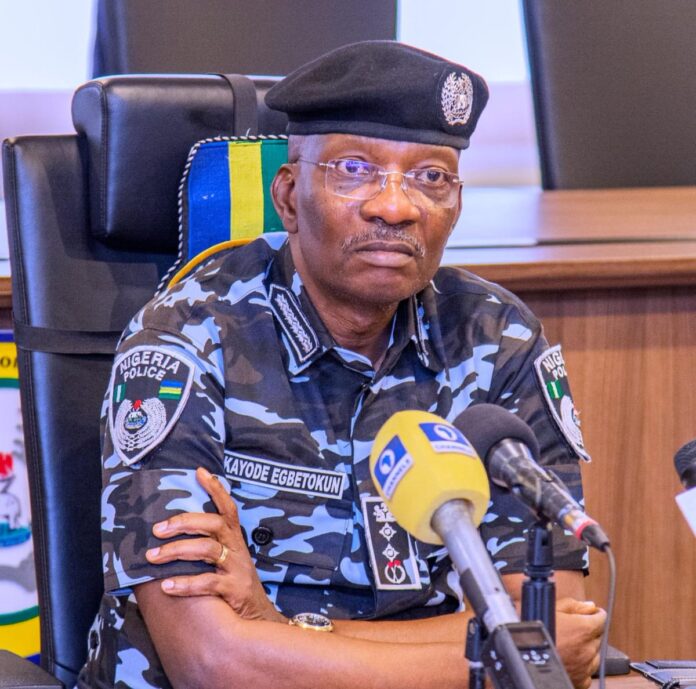The Inspector General of Police (IGP), Kayode Egbetokun, has described Nigeria’s criminal justice system as “weak” and “sick,” calling for a total overhaul to ensure justice and fairness across the country.
Egbetokun made this statement on Thursday during the 2024 Annual Lecture and Award Ceremony organized by the Crime Reporters Association of Nigeria (CRAN).
He likened the justice system to a sick person who urgently needs medical attention. Just like someone in need of a doctor’s care, Nigeria’s justice system must be revived and reformed to ensure it functions properly for the benefit of all Nigerians.
“The police is not the only pillar or stakeholder in the criminal justice system in this country,” Egbetokun said. “We have challenges, we accept, but we will try our best to make sure we have a better system.”
His comments come amid growing concerns about the state of Nigeria’s legal institutions, which have long been criticized for inefficiency, corruption, and delays in dispensing justice.
The IGP acknowledged that the police force is often blamed for the failures within the justice system but urged Nigerians to look at the bigger picture. “All of us must come together to help perfect the criminal justice or justice system administration in Nigeria,” he stated.
Egbetokun emphasized that a functional justice system would not only benefit the police but also the entire nation. He urged citizens to support efforts aimed at reforming the system, noting that its failure affects every sector of society.
The IGP was represented at the event by the Force Public Relations Officer (FPRO), ACP Muyiwa Adejobi, who echoed the call for collective action to improve the system.
Corruption and Challenges: ICPC Chairman Weighs In
Dr. Musa Adamu Aliyu, Chairman of the Independent Corrupt Practices and Other Related Offences Commission (ICPC), also addressed the gathering, highlighting corruption as one of the most significant obstacles facing Nigeria’s justice system.
Aliyu argued that corruption permeates all sectors of society, particularly in the justice sector. He stressed that it undermines decision-making, resource allocation, and service delivery across the country.
“Corruption remains one of the most persistent challenges affecting all sectors and institutions of the Nigerian society,” Aliyu said. “It undermines policy-decision making, resource mobilization and utilization, policy execution, and service delivery.”
The ICPC Chairman acknowledged the hard work of his commission in tackling corruption but warned that a more comprehensive approach was needed to tackle the issue. He argued that anti-corruption efforts must focus not only on enforcement but also on prevention, deterrence, and systemic reforms.
In particular, Aliyu pointed to the widespread issue of bribery and influence-peddling within the justice system. He highlighted that judicial officers, despite limited public contact, were often involved in corruption, further eroding public trust in the system.
“Bribery involving stakeholders in the justice sector, despite its relatively limited public exposure, is high,” Aliyu stated. “We need targeted anti-corruption measures to address these issues directly.”
A System Under Strain: Multiple Challenges Identified
Both the IGP and ICPC Chairman painted a grim picture of Nigeria’s justice system, which faces numerous challenges ranging from corruption to inadequate funding, poor infrastructure, and a lack of human resources.
Aliyu pointed out that the justice sector faces both institutional and socio-cultural challenges. He noted that these problems, if left unchecked, would continue to impede efforts to ensure justice and fairness for Nigerians.
The IGP also touched on the issue of inadequate resources, noting that even though the police force faces its own challenges, the broader criminal justice system as a whole requires serious attention. He called for greater collaboration between all stakeholders to address these concerns.
“Fixing the justice system is not a task for the police alone,” Egbetokun said. “We need the cooperation of the judiciary, lawmakers, and all relevant agencies. A functioning justice system will benefit every citizen, and we must all work together to achieve this.”
The Way Forward: Collective Action Needed
As Nigeria continues to grapple with issues of justice, the need for widespread reform has never been more urgent. The IGP’s remarks have sparked renewed discussions about the state of the country’s criminal justice system, with many calling for reforms that will address corruption, inefficiency, and lack of accountability.
While the police force plays a vital role, experts agree that real change will only come if all sectors involved in the justice system — including the judiciary, the legislature, and law enforcement agencies — work together to address these deep-rooted issues.
The ongoing efforts by the ICPC and other anti-corruption bodies offer a glimmer of hope, but as both the IGP and the ICPC Chairman emphasized, a comprehensive, multi-faceted approach is essential for tackling the systemic problems that plague the Nigerian justice system.

